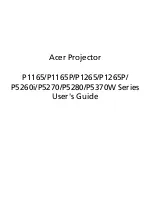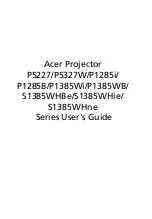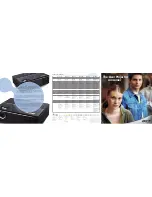
2. Installation Guidelines
Only ever use the manufacturer’s recommended cleaning kit which has been specifically designed for cleaning optical parts, never
use industrial strength cleaners on the projector’s optics as these will degrade optical coatings and damage sensitive optoelectronics
components. Failure to take suitable precautions to protect the projector from the effects of persistent and prolonged air contam-
inants will culminate in extensive and irreversible ingrained optical damage. At this stage cleaning of the internal optical units will
be non-effective and impracticable. Damage of this nature is under no circumstances covered under the manufacturer’s warranty
and may deem the warranty null and void. In such a case the client shall be held solely responsible for all costs incurred during any
repair. It is the clients responsibility to ensure at all times that the projector is protected from the harmful effects of hostile airborne
particles in the environment of the projector. The manufacturer reserves the right to refuse repair if a projector has been subject to
wantful neglect, abandon or improper use.
Special Care for Laser Beams
Special care should be used when DLP projectors are used in the same room as performant laser equipment. Direct or indirect hitting
of a laser beam on to the lens can severely damage the Digital MicroMirror Devices™ in which case there is a loss of warranty
Which screen type ?
There are two major categories of screens used for projection equipment. Those used for front projected images and those for rear
projection applications.
Screens are rated by how much light they reflect (or transmit in the case of rear projection systems) given a determined amount
of light projected toward them. The ‘GAIN’ of a screen is the term used. Front and rear screens are both rated in terms of gain.
The gain of screens range from a white matte screen with a gain of 1 (x1) to a brushed aluminized screen with a gain of 10 (x10)
or more. The choice between higher and lower gain screens is largely a matter of personal preference and another consideration
called the Viewing angle. In considering the type of screen to choose, determine where the viewers will be located and go for the
highest gain screen possible. A high gain screen will provide a brighter picture but reduce the viewing angle. For more information
about screens, contact your local screen supplier.
What image size? How big should the image be?
The projector is designed for an optimum screen width of :
•
For CineVERSUM 60 : min 1.30 m (52”) to max 1.78 m (70”)
•
For CineVERSUM 70 : min 1.55 m (61") to max 1.98 m (78”)
(depending on the ambient light conditions), with an aspect ratio of 16 to 9.
Depending on the used lens, the minimum and maximum diagonal screen sizes are :
For CineVERSUM 70
R9010080
Short throw lens (1.4 - 1.8)
Min : 0.80 m (32”)
Max. 6.35 m (250”)
R9010081
Long throw lens (1.8 - 2.4)
Min : Wide : 1 m (40”)
Min : Tele : 0.76 m(30”)
Max : Wide : 7.60 m (300”)
Max : Tele : 5.60 m (222”)
For CineVERSUM 60
R9002460
Short throw lens (1.7 - 2.25)
Min : 1 m (39”)
Max. 5 m (200”)
R9002461
Long throw lens (2.25 – 3)
Min : Wide : 0.8 m (32”)
Min : Tele : 0.60 m(24”)
Max : Wide : 6.0 m (240”)
Max : Tele : 4.50 m (178”)
2.3 Projector Configuration and Position
Which configuration can be used?
The projector can be installed to project images in four different configurations:
•
Front/table
•
Rear/table
•
Front/ceiling
•
Rear/ceiling
Positioning the projector
•
The projector should be installed perpendicular with the screen on a distance PD and water leveled in both directions. The
mounting positions in the following image is shown for a nominal lens position.
•
Position the screen so that it is not in direct sunlight or room light. Light falling directly onto the screen washes out the colors,
making viewing difficult . Close the curtains and dim the lights when setting up the screen in a sunny or bright room.
•
The projector lens should be centered horizontally in the middle of the screen.
8
R5976763 CINEVERSUM 60/70 22042004
Summary of Contents for 70
Page 1: ...HOME CINEMA CINEVERSUM 60 70 INSTALLATION MANUAL 22042004 R5976763 00 ...
Page 4: ......
Page 18: ...2 Installation Guidelines 14 R5976763 CINEVERSUM 60 70 22042004 ...
Page 28: ...3 Connections 24 R5976763 CINEVERSUM 60 70 22042004 ...
Page 38: ...6 Source Selection 34 R5976763 CINEVERSUM 60 70 22042004 ...
Page 60: ...8 Advanced Settings 56 R5976763 CINEVERSUM 60 70 22042004 ...
Page 84: ...A Specifications 80 R5976763 CINEVERSUM 60 70 22042004 ...
Page 86: ...B Maintenance 82 R5976763 CINEVERSUM 60 70 22042004 ...













































